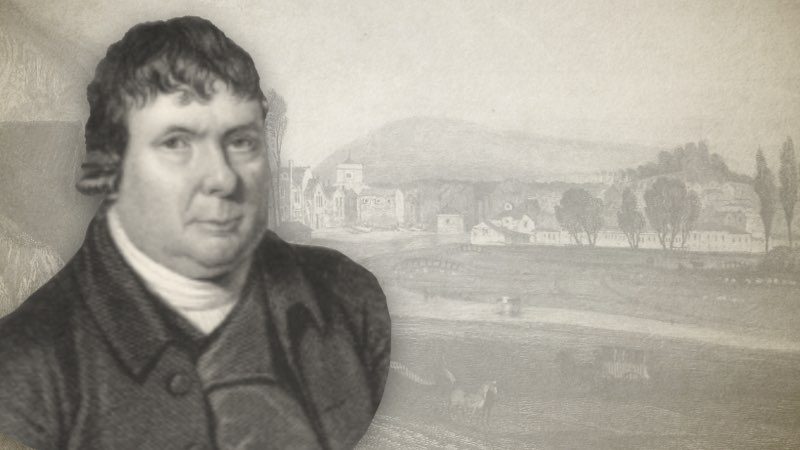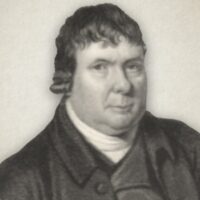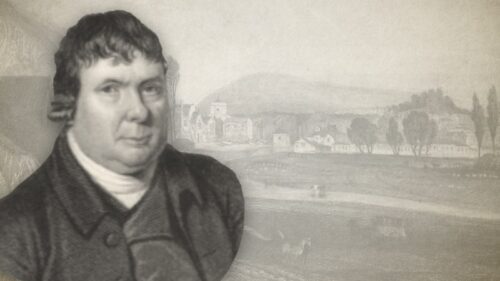
The Child of Liberty in Legal Bondage: Jealousy (5/11)
5. To the suspicion and jealousy that attends this spirit of bondage.
The Lord our God, “whose name is jealous, is a jealous God,” Exod. xxiv. 14. “How long, Lord, wilt thou be angry for ever; shall thy jealousy burn like fire?” Psalm lxxix. 5. The spirit of bondage brings a little of this ingredient with it. The spouse in the Song felt this pretty sharply; she refused to open to her beloved, and so he withdrew; she sought him, but found him not; she called him, but he gave her no answer. He then went down into the garden; that is, down among the more meek, humble, and lowly souls. This she knew, and begged these young daughters to stay her with flagons, and to comfort her with apples, for she was sick of love; and desired them to tell her beloved so when they saw him. Hence her own description of her feelings at this time. “Set me as a seal upon thy heart, as a seal upon thine arm: for love is strong as death, jealousy is cruel as the grave, the coals thereof are coals of fire, which hath a most vehement flame,” Song viii. 6.
It is easy to see where the penman of the Song learnt this lesson. “And the Lord was angry with Solomon, because his heart was turned from the Lord God of Israel, which had appeared to him twice, and had commanded him concerning this thing, that he should not go after other gods. Wherefore the Lord said unto Solomon, Forasmuch as this thing is done of thee, I will surely rend the kingdom from thee, and give it to thy servant,” 1 Kings, xi. 9-11, who was Jeroboam. The prophet Abijah meets Jeroboam, and tells him that he should reign over ten tribes, because Solomon had served other gods. Moreover, God promised by him, that, if Jeroboam would walk in God’s statutes, as David did, God would be with him, and build him a sure house. Solomon hears of this, and in his desperate madness fights against the very decree of God; determined to make his promise void, and his prophet a liar; “for Solomon sought to kill Jeroboam, but Jeroboam fled into Egypt,” I Kings, xi. 40. Solomon, in this rage of jealousy, had quite forgotten his own proverb: “He that doth violence to the blood of any person, let him flee to the pit; let no man stay him.” However, God kept him from his purpose; for Solomon was not to fly to the pit of hell as a murderer, nor to be beaten with eternal stripes, “I will for this afflict the seed of David, but not for ever” 1 Kings, xi. 39. And the Lord stirred up an adversary unto Solomon, Hadad the Edomite; and God stirred up another adversary, Resin, the son of Eliadah; and Jeroboam lifted up his hand against the king.
Such idolatry, and alienation of affections from God, God calls “the provoking of his sons and of his daughters;” and, as Solomon had “provoked the Almighty to jealousy with them that were no gods,” so God provokes him to jealousy by them which were no saints.
Sarah was afflicted with a little of this fire, when, in her wisdom, she would further the coming of the promised seed, by giving up her bed to Hagar; at whose conception the sterility of the family was fairly proved to lie at the door of Sarah, and not at the door of Abraham. She drives Hagar out of the tent, to get rid of the cross that she had brought upon herself. The angel of God sends Hagar back again, that Sarah might be filled with her own ways. How she felt this I must leave those to guess who are in the secret. I believe she was never perfectly healed of this disease till she had got the promised seed upon her knees, and the bond woman and her son out of the tent.
When the spirit of jealousy comes upon a man, it doth not stay here. Such an one is not only jealous of the love and favour of God, so as to envy the happiness of all that enjoy the light of his blessed countenance; but he is jealous of his own honour, and jealous of the affections, good-will and applause of every body. Such an one cannot bear to hear another spoken well of; he views every one in any esteem a rival to him. The apostles disputed which should be the greatest, though they were ashamed to own it; “and the ten were filled with indignation at James and John,” for wanting to sit at the right hand and at the left of Christ in his kingdom, which they supposed was to be a temporal one.
This jealousy often terminates in carnal jealousy. The man is jealous of his wife, or she is jealous or her husband; and such souls are preparing their bitter waters, ashes, and jealous offerings, all the day long; “for jealousy is the rage of man,” and so it is of woman; “and such will not rest contented though thou givest many gifts;” nothing can remove it, but him that sent it: for it is the working of the spirit of bondage, and a terrible ingredient in it; and let those, who have felt the bitterness of it, take heed that they do not procure these things to themselves by provoking God, or others, to jealousy; for, if they do not procure them by these, they are not likely to have them themselves.
The reasons of God’s sending these things upon his people are these, God is good, great, and glorious; and is jealous of his own praise, glory, and honour, which he will never give to another. God is a husband; and is jealous of the love, obedience, and affections, of his own church, and will not be provoked with a whorish heart. Now, if his people bow their knees and give his praise to idols, as Solomon did; or if any rival to God be set up, called, “the image of jealousy, which provoketh to jealousy;” or if the affections be alienated from God, and gone after covetousness and the love of money, as Israel’s heart was, which provoked God to wrath; or if inordinate affections, which are a member of the old man, be indulged to the creature, as David’s was to Absalom, and Jacob’s to Rachel, Jepthah’s to his daughter, Jacob’s to Joseph, or Eli’s to Hophni and Phineas-these rivals to God are sure to be removed out of the way, or left to be a snare to the indulger. For when God is moved to anger, wrath, and jealousy, by the provocations of his people, he will then send the spirit of bondage upon them, and influence them with the same anger, wrath, and jealousy which his people provoke him to.
This may be seen in the matter of Eli – “Wherefore [saith God] kick ye at my sacrifice, and at mine offering which I have commanded in mine habitation, and honourest thy sons above me?” I Sam. ii. 29. They kicked at God’s sacrifice, which provoked the Lord; they abused the women that came to the house of God, “till people abhorred the offerings of the Lord; [which is called] grieving the Lord.” Eli honoured his sons before God, by continuing them (from motives of affection) in the priests’ office, whereby God was dishonoured. And all this God turns upon Eli: Samuel shall provoke Eli, as his sons had provoked God. “And thou shalt see an enemy in my habitation; and there shall not be an old man in thine house for ever; and the man of thine, whom I shall not cut off from mine altar, shall be to consume thine eyes, and to grieve thine heart,” I Sam. ii. 33. Thus Eli was to see an enemy, a rival in God’s house, who was to consume his eyes; whom he was to view with a suspicious and jealous eye, to the grief of his heart. After this God begins to provoke him: for he speaks to Samuel, though a child, but no more to Eli. And thus God, when provoked to jealousy, puts those who provoke him, as it were, in his own place; then asks them how they like it, “and if they have not procured these things to themselves, in that they have forsaken the Lord their God,” Jerem. ii. 17. And this is no more than the law of retaliation-measure for measure.
William Huntington (1745-1813) was an English Calvinist preacher and prolific writer. His influence spread across the country and denominational lines. John Hazelton wrote of him—
“He published one hundred books, large and small, and once mentions being "weary at night, after having been hard at writing for fifteen hours during the day." Henry Cole wrote of him—‘’It may be asked why in my ministration, such as it is, I make frequent allusion to the ministry of that great and blessed servant of the Most High, the late Mr. Huntington. The reasons are these—1st. Because I believe he bore and left in Britain the greatest and most glorious testimony to the power of God's salvation that ever was borne or left therein. 2nd. Because I believe he planted the noblest vine of a Congregational Church that ever was planted therein; and 3rd. Because I believe the Churches that maintain the vital truths he set forth form a very essential feature in the Church-state of Christ in the land in these times, and perhaps will do so to the time of the coming day of God's retribution."
William Huntington, The Child Of Liberty In Legal Bondage (Complete)




